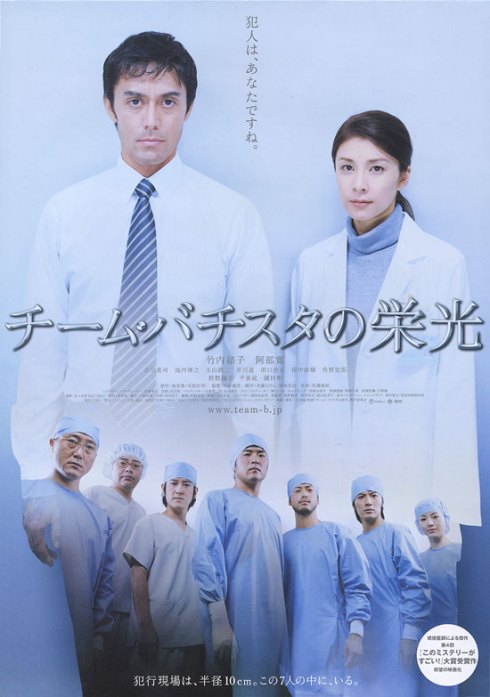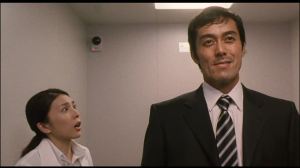
Before I get on about the movie, I shall provide a brief explanation on three aspects of ‘hearing’, as given by our male protagonist, Shiratori Keisuke:
- Passive ‘hearing’: You sit and listen. Even a monkey can do that.
- Active ‘hearing’: Aggressive inquiry.
- Offensive ‘hearing’: Using bluff to induce strong emotions, like anguish and shame, in people.
Meet Taguchi Kouhei, hospital therapist, who was assigned witht the task of investigating Team Batista, an elite group of surgeons and medical specialists specializing in the Batista procedure. Despite having a normal survival rate of 60%, the team managed to pull off 26 consecutive successful surgeries, but their latest streak of 3 operations had all resulted in deaths, and thus the investigation. After conducting her style of investigation, Taguchi merely concluded the cause to be ‘unexplained’.
Then enters Shiratori Keisuke, a professional investigator with the Ministry of Health, Labour and Welfare. A proud, almost arrogant, man, he described Taguchi’s investigation as ‘passive hearing’ (see above) and dismissed it, instead reconducting the investigation with ‘active and offensive hearing’ (see above), for he strongly believed that the last 3 operations were cases of murder.
Two different styles of investigations, two very different conclusions (trying hard not to spoil the movie hard).
Talking about Taguchi, firstly, her position in the hospital is that of an employee, and she sees herself as of a lower position that the people she has been tasked to study. And so, her method of questioning is meek, as any wrong moves might cost her her livelihood. Secondly, the requirements of her (original) job. She basically has to listen to the many complaints patients might have, and then access the course of action from there. She rarely provides suggestions. And so, it can be concluded that her investigation was conducted in the same manner, with her decoding the possibly biased messages from the team, witout any feedback whatsoever.
Now on Shiratori, he has power, and he is not afraid of abusing it. With an ego to match his authority, he strikes fast and hard on his targets; in this case, the doctors in Team Batista. And with his straight-to-the-point inquiries and the use of Taguchi as a ‘scapegoat’, many surprising points were indeed uncovered, though having paved a road of dissent, and even violence, along the way.
Linking to the study of communication, one important aspect will be perception. Analysing the perceptions of Taguchi:
- I am but a lowly employee roped into this investigation…
- I know nuts about the simplest surgery, let alone the Batista procedure!
- Do this wrong, and say goodbye to my job. *shiver*
- They are all professionals in the medical field. No way can those cases be murder!!
- Oh crap! She cried! What should I do!?
These are just a few examples. Interestingly, she also related every member of the team to a specific animal that is a best representation of them…according to her anyway.
 That’s an eagle…by the way…
That’s an eagle…by the way…
And now on Shiratori:
- They are all monkeys, and I will study them like the monkeys they are.
- They are all hiding something. Definitely!
- Just because the patients died in the Batista procedure doesn’t mean that their deaths have all got to do with the heart.
- I am from the Ministry, and so they will all have to bend to my will and order for this investigation.
- This is my job, and my job is to deem everyone as a suspect. A suspect in these cases of murder.
It can be also interpreted that his view on things are rather peculiar, compared to that from the general perspective. For instance, he was having a bowl of udon and a bowl of soba together, and this of course intrigued Taguchi (and many others, I believe). He then explained that he wasn’t having them as the main dishes together; the bowl of udon is merely a side-dish to his bowl of soba.
You got to hand it to this man.
Nevertheless, due to the difference in perception, the way these two individuals look at the cases are almost of oppposite ‘polarities’, and in turn, the results of their investigations have a vast difference.

Another point in the study of communication would be the use of non-verbal cues. For instance, the nurse in the team, Otomo, seemingly broke down into tears in both questionings by Taguchi and Shiratori. Taguchi had the common reaction: panic. But for Shiratori, being the ‘jerk’ that he is proud to be, he simply pulled Otomo’s hands away from her face, and then teased her: “I don’t see any tears from your eyes~~.” The nurse had succeeded with Taguchi, but she didn’t got her way with the inquisitive Ministry official.
 Taguchi’s at a loss…
Taguchi’s at a loss…
 …while Shiratori gives no mercy
…while Shiratori gives no mercy
This is a rather amusing film, and it’s quite hard to classify it under a specific genre. It’s a mystery movie at heart, yet with Abe Hiroshi in it, you will expect a fair share of comedic factors throughout. And also, it also has thought-evoking emotional scenes in it, especially with Taguchi when dealing with the patients, and with the truth.
And with the movie centering on the testimonies of the characters, us communication students can have quite a numbers of things to study from this (or is it just me?).
Anyone watched it yet? Mind sharing any points I might have left out? 😀



6 comments
Comments feed for this article
February 14, 2009 at 11:58 am
Olivia
Wow, I haven’t watched the movie yet, but after reading your post, I’m really intrigued by it! The way you gave different perspectives to what the two characters think really reflects the kind of people they are.
Of course, this also shows how good the actors can be. The way they respond to the crying nurse clearly potrays their own respective characters well. The meek Taguchi worries about what she had done, while the hard handed Shiratori merely mocked the nurse for her fake crying. Its a pretty obvious contrast between Taguchi and Shiratori that the movie has shown, and audiences will surely be drawn to their vast differences to see how will thier methods solve the mystery.
Another detail I found interesting is how Taguchi potrays the people on the team with different animals. It really shows that perspective plays a great part in her thinking when she links those animals with different impressions she has on them.
Nice post and introduction to the movie!
February 14, 2009 at 1:50 pm
James
thanks for breaking down what team batista is about all . somehow i feel that japanese are pretty good in expressing their non-verbal cues, especially facial expression. they are so convincing.
Once again, from your entry i can see how “perception” can influence both our behavior and communications.
March 22, 2009 at 11:32 am
Kelvin
Haha too bad we can’t do this for our project huh? Likes the in-depth analysis provided too bad I wouldn’t have time to enjoy the show. Non-verbal cues are an extremely good way of portraying under-lying meanings to words that normally make no sense aren’t they?
March 28, 2009 at 4:19 am
MavericK
I’m feeling like how you feel, brother. LOL!
March 27, 2009 at 11:39 pm
Rachel
Whoa! A long and analytical article on the Team Batista movie! I like the way you point out the perceptions of the two main leads of the drama series. And yeah, the non-verbal communication in Japanese drama series should be more than the drama series in the West, as Japanese tend to use non-verbal cues/communication to convey some under-lying messages, dun they?
I think that both the main leads interpreted Otomo’s crying, the nurse in the team, correctly. But the male lead just liked to be the jerk that he always is right? And so he behaved like he didn’t get the meaning of the nurse, while the female lead responded genuinely, and conveyed to the nurse that she got the message that she was sad as well? But was the crying of the nurse a genuine one? Body language can lie too.. but i feel that the eyes can’t never lie and deceive a person.
March 28, 2009 at 4:22 am
MavericK
The Japanese are indeed good at that.
Just go research on ‘honne and tatemae’, and you’ll be surprised.
About eyes never deceiving, it is true to a certain extent, yet it can be trained. Take actors for example. Many scenes involve nothing but shots of facial expressions, but if the actor is not good enough, he better be prepared to hear criticisms, and work harder the next time onwards. 🙂